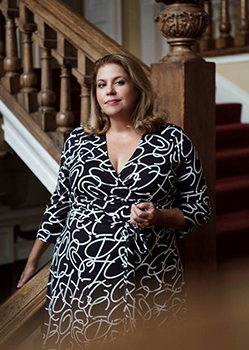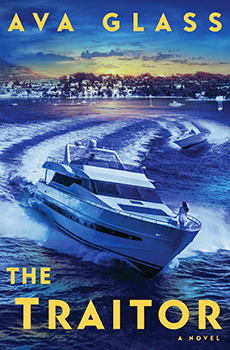Not Your Mother’s Spy
The Big Thrill Interviews Ava Glass
What is it about spy stories we love so very much? The danger? The intrigue? The gadgets? Whatever it is, we can’t get enough.
Thank goodness Ava Glass is back with her latest novel in the Emma Makepeace series. THE TRAITOR is a million-mile-an-hour thrill ride set in the glorious Mediterranean. It’s a terrifying twist on a closed-circle mystery with Emma locked on a luxury yacht with a tempestuous Russian oligarch, his murderous bodyguard, his troubled mistress, and his alternately loyal and disgruntled staff.

© Jamie Drew
The Big Thrill was pleased to sit down with Ava Glass to talk about our love for spies and how Emma stands apart from the James Bond archetype.
You’ve said in other interviews you were influenced by Ian Fleming and his immortal hero James Bond. However, you’ve made sure Emma Makepeace isn’t superhuman—you’ve given her flaws and allow her to get hurt in order to make her more realistic and less fantastical. Why do flaws make a character more believable to the reader?
Fleming was influenced by these 1950s British daring-do post war novels about can-do guys who would go into the fight and come out okay. There was a lot of struggle in the 1950s, and I think Fleming was influenced by those [can-do] characters. He made James Bond … somebody who can get through any situation, however dire. It’s very of-its-time.
I’ve got this thing when a character is completely perfect—I start to not care about them as much because I think I’ve never met anybody who doesn’t make mistakes. I worked for the British government for a while, and my job brought me in connection with spies. And the spy I worked with the closest, once—on his way into work from wherever he really lived—left a secure laptop on a train. He was in that commuter mindset—he got up really early, came in, and got all the way to the office—when he realized he didn’t have [the laptop]. And that just can’t happen. He had to immediately report it, run back to the station, and explain who he was to security at a train station, which again, you just can’t do. So, many rules had to be broken.
They did find it. Because there’s so much CCTV in this country, they literally could watch a woman see the laptop bag, pick it up, and get off the train. They followed her home using CCTV. By the time they got there—the police, the various security agencies, far more [officials] than she could ever have imagined—she was in the process of trying to wipe it, which is almost impossible with a secure laptop. But this was a mistake made by a spy. A very good spy. And that’s what real life is like. The best, the smartest, the brightest, sometimes they leave a secure laptop on a train.
The majority of THE TRAITOR takes place on a luxury yacht, in the south of France, and in ports of Spain. Please tell us you had to take many, many research trips.
I would love to have researched it even more than I did. I did set it in places I know so I could write it faster. The only place I actually had to go to personally that I’ve never been to before was Saint Tropez. For the Barcelona section, I wrote it and then I realized I really don’t know where Russians hang out in Barcelona. But I’m not going to fly to Barcelona to find out, so I [called] a friend who’s a travel writer based there and said, “Where do the Russians really hang out in Barcelona?” And she said, “The W Hotel.” And so I just grabbed that [for a crucial scene].
I’ve got this thing when a character is completely perfect—I start to not care about them as much because I think I’ve never met anybody who doesn’t make mistakes.
Part of being a spy is not knowing who to trust, yet Emma has such hope and innate trust in the world around her. How do you seamlessly pull us into her world and get us hoping and trusting along with her despite us knowing this is a recipe for a disaster?
It’s tricky, isn’t it? I do think the key to caring what happens, even if a book has the greatest plot ever written, is character. To me, Emma Makepeace is almost a real person. I can see her in my mind. I can hear her voice in my head. I know so much about her childhood, her background and where she lives. I feel it deeply. And what I’m hoping is, if I can convey how she lives and a little bit about her family, that you feel like you know her too. Then you care.
And when she makes mistakes, when she’s wrong about things, when she doesn’t want to believe something that we as outsiders can see in front of us, [we can] understand why she doesn’t want to believe it. If we can understand that, then it makes it more painful when she’s wrong. I want us to want her to be right, but it’s not feasible that she would always get it right.
Why does our society have such a romance with spy stories?
I’ve thought about this so much because I don’t entirely understand [why people like them]. It’s a dubious morality to start with. If you really think about spying, it is actually deception on a grand scale, but it’s deception for the good of the nation. I think it goes beyond the reality of spying and it’s simply through such epic espionage figures who were created in the 20th century by writers like Fleming and le Carré and actors like Michael Caine, that we developed a love affair.
What’s next?
The next book takes place a few months [after the end of THE TRAITOR]. The working title is The Seven, and we’re hoping to release it September 2024. It’s set in October when the G7 is meeting in Scotland. They believe somebody’s going to try to assassinate one of the world leaders, but the information on this is so slight, they don’t even know who’s behind it.
Alias Emma is now out in paperback. To learn more about Ava and her work, please visit her website.
The Big Thrill Interviews Ava Glass











